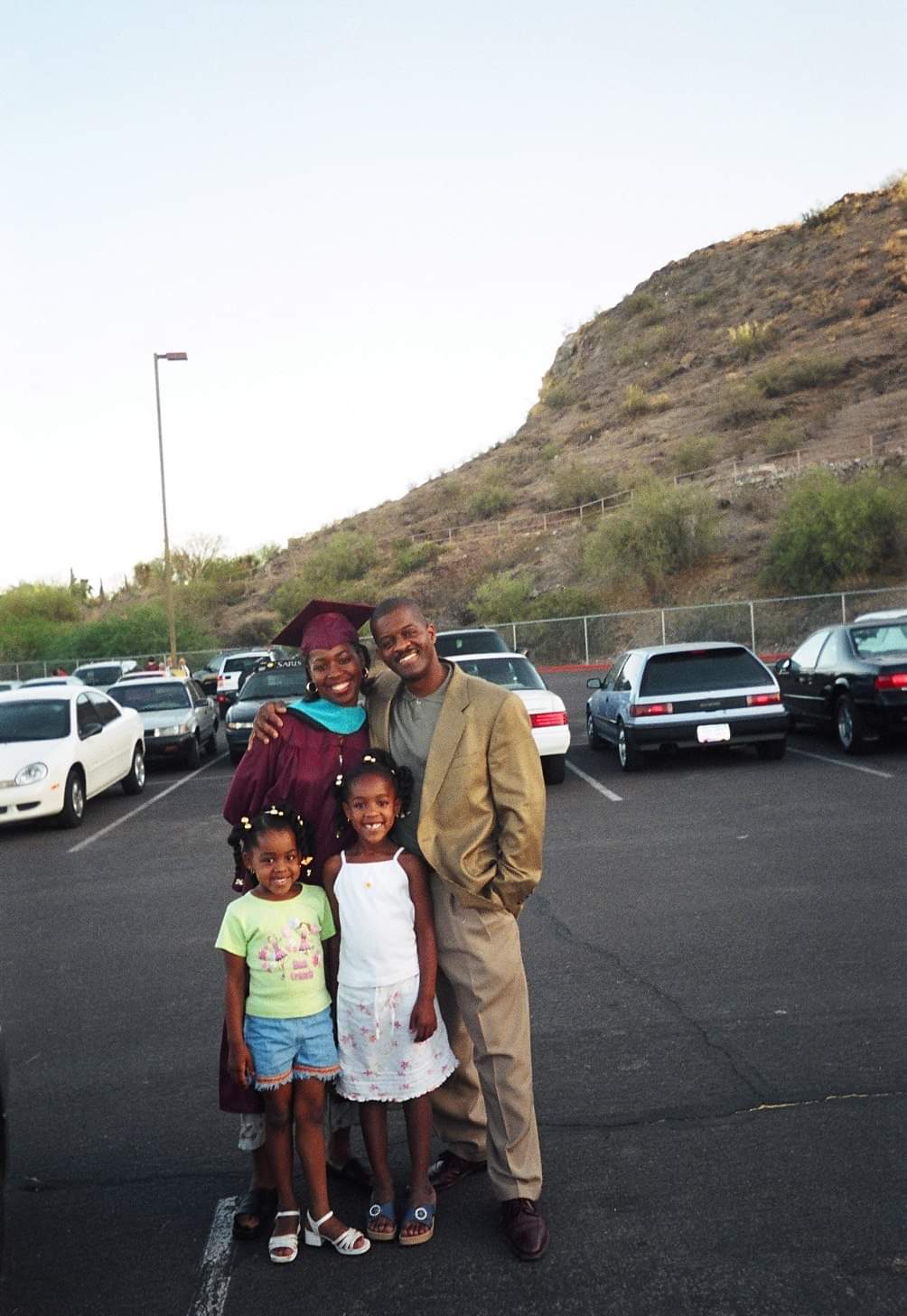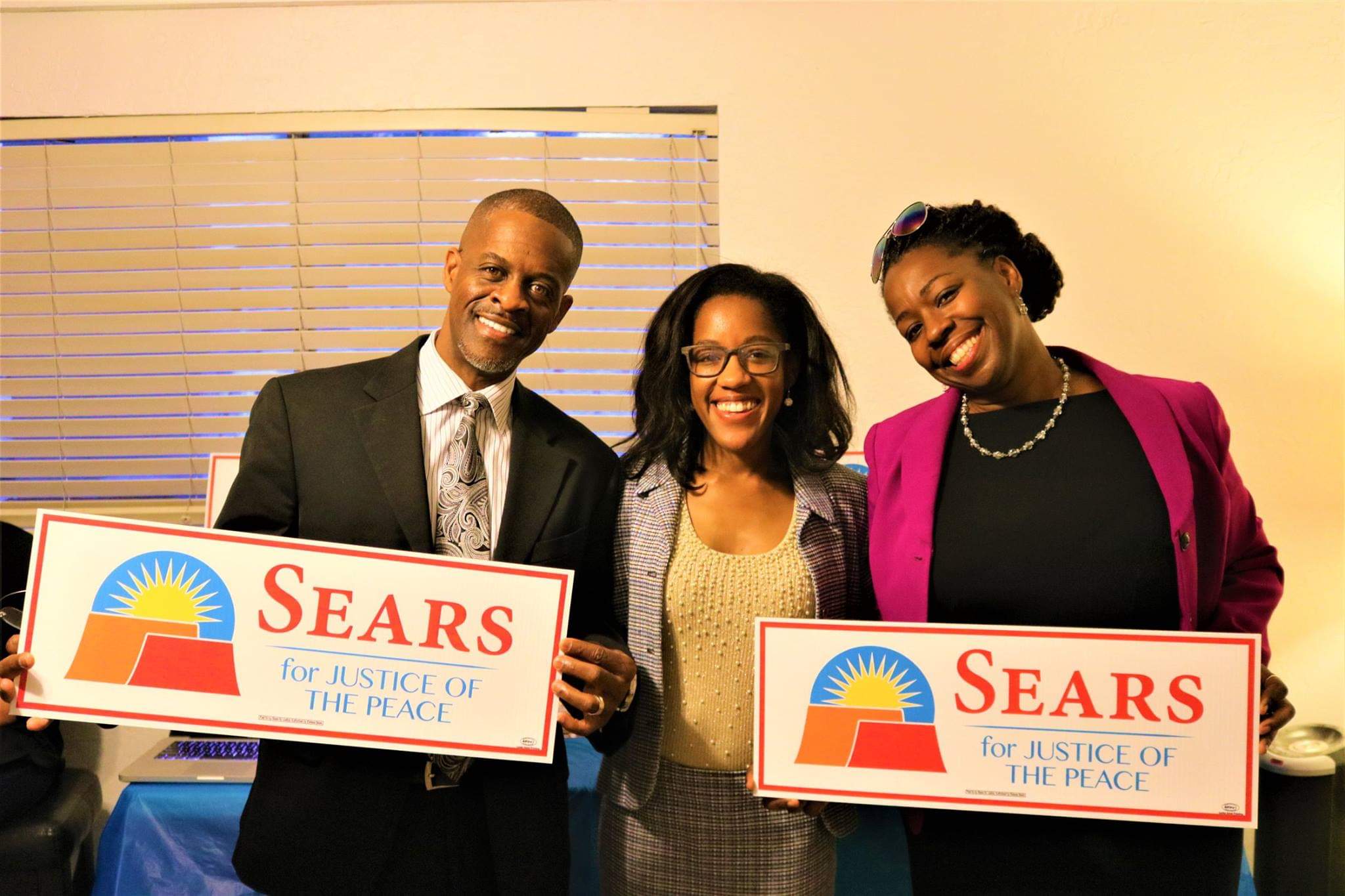ASU alumna tackles community issues in the courtroom as current youngest justice of the peace in Arizona

Elaissia Sears, an alumna of The College of Liberal Arts and Sciences' School of Politics and Global Studies, was sworn is as justice of the peace for the West Mesa Justice Court this January.
When Arizona State University alumna Elaissia Sears was sworn in as a justice of the peace for the West Mesa Justice Court this January, she marked milestones for herself and Arizona.
At 24, she was the youngest person elected into state office in the 2018 election, and one of just three African American women in Arizona history to hold the position.
Her court presides over everything from DUIs and speeding violations to evictions and weddings. With some 400 cases a week, she has one of the largest loads in Maricopa County.
Only a few months into a four-year term and already planning to run for re-election, Sears is settling in for the long haul. But the journey here began while she was pursuing a much different path at the Arizona State Capitol in 2017.
Back then, just shy of an undergraduate degree from The College of Liberal Arts and Sciences’ School of Politics and Global Studies, she was working as a legislative assistant. On one of her lunch breaks, she saw a group of juvenile inmates filing through the Capitol grounds.
Seeing the beige-clad group against the bustling backdrop of the legislative chambers, Sears was struck by what felt like a profound disconnect.
“Someone just said, ‘Oh, they’re from the kid prison’; they were in seventh or eighth grade,” she said. “Having them there at the Capitol and normalizing that, it made me really upset.”
Her work there included working alongside representatives to advance local goals. But the role seemed far from everyday people whose lives she hoped to reach.
She started to consider an alternative. Why not run for office?
Exploring her options, Sears started sitting in on court sessions and researching positions.
“I realized these roles were amazing because you actually had the opportunity to impact somebody's life, every single day,” she said. “And that person can know that it was your decision.”
Sears ran a campaign focused on bolstering educational opportunities for Mesa residents, bringing awareness to community and social issues in the district and implementing restorative justice practices to reduce youth incarceration rates.
She answered questions about the journey, her time at ASU and what she has discovered in her new role so far.
Question: Your campaign touched a lot on implementing restorative justice techniques to the courtroom and the community. What does that mean in practice?
Answer: So, when we're talking about restorative justice, what we’re really talking about are ways to hold the perpetrator accountable, while also making the victim whole again. When a child misbehaves in school, for example, you don’t just suspend them and that’s the end. You address it head on by finding the root cause and talking about it. If there is a victim, we first give restitution, and then make it an educational experience. That happens instead of just branding someone as a criminal, giving them a fine and telling them to get out.
Q: Are you able to implement some of those ideas in your courtroom as a justice of the peace?
A: As justices of the peace, we have a large amount of discretion, especially for juvenile cases. We are able to issue things like a 1,000-word essay about why you shouldn't be going 55 miles per hour through a 15-mile-per-hour residential zone, for example. That is in addition to driving school or whatever you decide is reasonable. It's really just about making sure justice isn’t a cookie-cutter process. You really want to tailor each ruling to the case and person. For some people, a $700 fine is reasonable. But somebody with that same offense may not respond the same way. So it's really about looking at everybody on an individual basis and figuring out what justice looks like for them. People are already coming to court nervous because many do not have any trust in the justice system. I want to make them feel like it’s going to be fair.
Q: In your campaign, you also talked about the value of education in tackling social issues. How have your own experiences informed that perspective?
A: I've taught in the Dominican Republic and South Korea through different international opportunities at ASU and also here in the Valley. I'm really invested in education because I feel like without my own, I wouldn't be who I am today.
My mom was also heavily involved in that. I grew up in Mesa, and my mom was elected as a board member of Mesa Public Schools in a campaign no one thought she would win. Her victory made me realize it was possible for real-life people to step up and make a difference.
Q: You have worked in international contexts, local politics and, now, in a local judicial role. What has it been like to move through all of those positions?
A: One thing I learned working as a legislative assistant is that we as millennials are doing a lot of the heavy lifting, whether we're being seen or not. That made me feel disillusioned.
I am a person who is just a doer. That is why I liked teaching. I feel empowered, honored and humbled in this new role because it is really about the community: The taxpayers are paying for my salary and for me to be in this building, all so that I can serve them.
Q: Can you describe your Sun Devil story? What brought you to ASU?
A: Both of my parents have master's degrees from ASU. My dad went to Yale for his undergraduate studies, but my mom did both degrees here. She had me when she was 19, and we moved here from New Orleans when I was just a baby. When she had class, I was in the backpack eating Cheerios as a 3-year-old — so ASU is basically where I grew up!
Q: What brought you to the School of Politics and Global Studies? How did your program and The College of Liberal Arts and Sciences help prepare you for your career?
A: I initially went into the field to join the State Department because I had been so inspired by having exchange students all the time at home — my family hosted people from several different countries growing up. That really taught me that diplomacy is extremely important; people being able to work together is extremely important.
While completing my undergrad, I taught overseas, and here in Phoenix I worked with exchange students at Phoenix Sister Cities. I also worked as a teacher’s assistant while running for office.
Honestly, without the School of Politics and Global Studies, my life would be extremely different. I got to see countries from many different facets, whether global health, politics or social issues.
In addition to my degree, I have a minor in German and certificates in political entrepreneurshipSears also serves as the community director of Urban Farming Organics, a local business created through ASU Entrepreneurship + Innovation group, Venture Devils., women and gender studies, and international studies, all from The College. I was very grateful to be a part of all of that. And I feel like the courses fit together and translate well (to different career paths).
Q: What has been your biggest motivation to succeed professionally?
A: My parents have always been really adamant about education and the idea of thriving versus surviving. A lot of my drive comes from that. Both of my parents grew up in New Orleans, and they did not have the same opportunities that I'm afforded. And when I say New Orleans, I'm talking Ninth Ward, where literally everything was wiped out by Hurricane Katrina. They had to fight their way out. I think advancing that family legacy is important.
Bringing visible leadership for young people, women and African Americans is also important. I have people come into my court and tell me they never thought they would see someone like me here. I have people come in for weddings and they are just so surprised and happy to see a black judge. That might sound funny, but it really is a big deal.
Elaissia Sears poses with her parents after her winning election to become a justice of the peace for the West Mesa Justice Court in November 2018.
Q: What would you like people to know about Mesa?
A: Growing up, I didn't have a lot of diverse experiences aside from all of the exchange students we hosted. That’s one of the main reasons why my mom was so passionate about it.
The city is sometimes bisected into east and west quadrants. Each has a different experience. West Mesa, where my court is based, tends to have more people of color. My justicial precinct serves a population that is around 70 percent Latino, and also includes the Salt River Pima-Maricopa Indian Community. A lot of people don’t realize that Mesa is diverse today and becoming more so. We also have a lot of entrepreneurship, up-and-coming art spaces and city revitalization. We need leadership that reflects that, and it’s coming!
Q: What advice would you have for those who are still in school?
A: If there is something you want to do, reach out to someone who is really invested in that field. Experts are often ready to help others get where they want to go, and they want to hear from you. Work with your advisers and internship coordinators. There may be an amazing opportunity you would be perfect for; you just have to do it.
More Law, journalism and politics
Can elections results be counted quickly yet reliably?
Election results that are released as quickly as the public demands but are reliable enough to earn wide acceptance may not…
Spring break trip to Hawaiʻi provides insight into Indigenous law
A group of Arizona State University law students spent a week in Hawaiʻi for spring break. And while they did take in some of the…

LA journalists and officials gather to connect and salute fire coverage
Recognition of Los Angeles-area media coverage of the region’s January wildfires was the primary message as hundreds gathered at…



